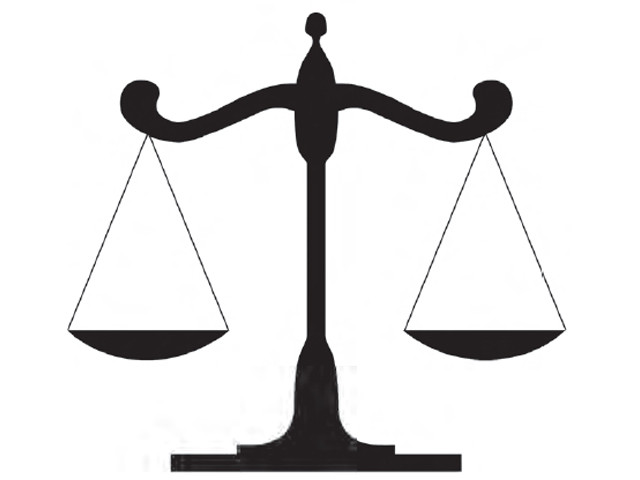Parliament urged to review Article 175(A)
While announcing the 18th amendment verdict, SC orders Article 175-A to be sent back to the parliament.

Parliament urged to review Article 175(A)
In a decision that has served to lower political temperatures, the Supreme Court urged the parliament on Thursday to review a controversial clause of the 18th Amendment that empowers legislators to veto appointments to the superior judiciary.
The decision, read out in a jam-packed courtroom, has been hailed by the government as a “victory for parliament’s supremacy”.
The newly-inserted Article 175(A), which envisages scrutiny of judges’ appointment by a parliamentary committee, was challenged in the Supreme Court through more than 20 petitions.
The interim order by the 17-member bench of the apex court appears to settle a key constitutional question: Whether a constitutional amendment can be struck down by a judicial order or not.
Chief Justice of Pakistan Justice Iftikhar Muhammad Chaudhry, while presiding over the larger bench, read out the interim order.
The court’s order read: The Article 175(A) should be amended in a manner that, “in all cases of an anticipated or actual vacancy a meeting of the Judicial Commission shall be convened by the Chief Justice of Pakistan in his capacity as its chairman and the names of candidates for appointment to the Supreme Court shall be initiated by him, of the Federal Shariat Court by the Chief Justice of the said Court and of the High Courts by the respective Chief Justices”.
The “Chief Justice of Pakistan as head of the Judicial Commission shall regulate its meetings and affairs as he may deem proper”.
It also mentions that “the proceedings of the parliamentary committee shall be held in-camera but a detailed record of its proceedings and deliberations shall be maintained. The parliamentary committee shall send its approval of recommendations of the Judicial Commission to the prime minister for onward transmission to the president for necessary orders. If the parliamentary committee disagrees or rejects any recommendations of the Judicial Commission, it shall give specific reasons and the prime minister shall send (a) copy of the said opinion of the committee to the Chief Justice of Pakistan and the same shall be justiciable by the Supreme Court”.
However, in the meantime, according to the order all cases of fresh appointments of “judges of the Supreme Court, Federal Shariat Court, high courts and additional judges of the latter courts shall be processed forthwith under Article-175(A).
The court has adjourned the 18th Amendment case on other issues till the last week of January next year.
The Chief Justice also directed the registrar of the august court to send a copy of this order to the Senate chairman, the Speaker of the National Assembly, as well as to adviser to the prime minister and chairman of the Special Committee of Parliament for Constitutional Reforms Mian Raza Rabbani and to the secretaries of law and justice and human rights division.
All is well with the govt
A cheering government has welcomed the interim order by the Supreme Court on a ‘contentious’ clause of the 18th constitutional amendment case, promising to implement it and calling it a booster for parliament’s respect.
Prime Minister Yousaf Raza Gilani immediately reacted to the decision with gratitude and contentment.
“The respect of parliament has been further enhanced. The judiciary has proved that they see us with esteem,” Gilani told the media on Thursday, a few hours after the announcement.
Earlier in the day, the court asked the government to review the mechanism of appointing judges envisaged in the constitutional amendment that was approved by parliament in April. It was feared that the court may strike down the clause that authorises a bipartisan parliamentary committee to scrutinise appointments in the superior judiciary, a condition that was immediately challenged through a score of petitions.
But the court refrained from scrapping the clause, upholding a government argument that only parliament had the right to amend the constitution.
Gilani said that the government would immediately begin the process of consultation with key individuals and institutions to look into how it could implement the order in spirit.
Gilani meant what he said. Instantly, the prime minister’s adviser Senator Raza Rabbani, who headed the Parliamentary Committee on Constitutional Reforms (PCCR), called a meeting of the panel for November 1. Rabbani is currently on a visit to London.
Gilani said that being a veteran parliamentarian and a former speaker of the National Assembly, he had predicted that the decision would be ‘positive’ and now everyone could see that indeed it was.
Reaction of other parties
The decision has been hailed unanimously. Not just the government but other political parties have also expressed satisfaction over the ruling which they believe has saved state institutions from ‘crisscrossing’ each other.
Pakistan Muslim league-Nawaz (PML-N), however, saw a vindication of a stance it took before the passage of the 18th amendment. PML-N chief Nawaz Sharif had been calling for consultation with Chief Justice Iftikhar Muhammad Chaudhry before finalising the draft for the amendment.
“The decision has validated the concerns expressed by Nawaz Sharif before the 18th amendment was passed that the judiciary must be consulted on the appointment of judges,” a spokesperson for the party said.
“Had that been done, things would have been different. However, the decision has foiled hopes of all those who wanted to see the Supreme Court and parliament pitted against each other,” PML-N information secretary Ahsan Iqbal added.
Representatives of the Awami National Party (ANP) and the Pakistan Muslim League-Quaid (PML-Q) have also welcomed the decision. The Muttahida Qaumi Movement (MQM) and Jamiat Ulema-i-Islam-Fazlur Rehman (JUI-F), however, preferred not to come up with an instant reaction.
Published in The Express Tribune, October 22nd, 2010.



















COMMENTS
Comments are moderated and generally will be posted if they are on-topic and not abusive.
For more information, please see our Comments FAQ